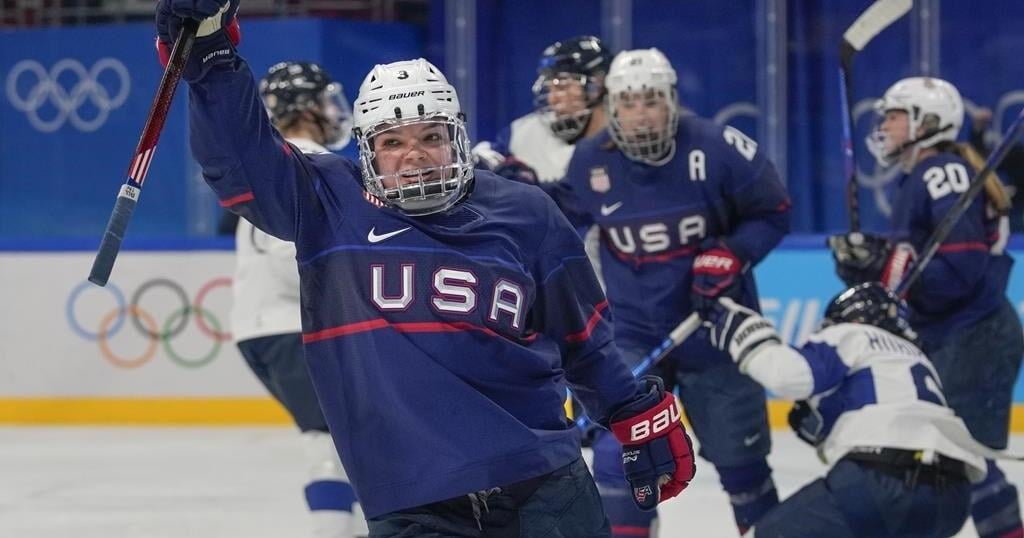MONTREAL – The hype hasn’t faded for the Montreal Victoire heading into a second Professional Women’s Hockey League season.
After a momentous inaugural campaign, team names, logos and an influx of new talent are generating more excitement in Year 2.
“It’s a second season, but it’s like it’s a first one for the Victoire because we have a name, unlike last season, and the level of play has increased,” general manager Danièle Sauvageau said after Montreal’s first on-ice session at training camp on Thursday.
“It keeps going. The fervour hasn’t dipped at all, I think it has gone up a notch.”
Victoire captain Marie-Philip Poulin expects the league to reach even higher with a record-breaking year under its belt.
“Every time I start a new season, it reminds me of why I do it,” she said. “I love doing this, I’m still passionate, we have girls from all over the world, five languages in the locker room, it’s incredible. It’s fun to experience this, the second season is only going to be better.”
The Victoire are also eager to avenge a gutting playoff exit last season.
Montreal finished second in the regular season before suffering three straight overtime losses to Boston, despite dominating the shots in the semifinal series.
“We’re extremely excited. In Year 1 we were, but coming back after a playoff loss we didn’t want to happen, we’re refreshed, we’re rejuvenated,” forward Laura Stacey said. “We have a new group here. It’s a new era.”
The Victoire hope they’ve addressed one of their most glaring issues from last season: a lack of depth.
Star players Poulin, Stacey and Erin Ambrose, among others, stacked up an exorbitant amount of ice time during the playoffs, while those deeper down the lineup barely saw the ice.
But several new names entered the rink on Thursday at Verdun Auditorium, namely sniper Lina Ljungblom — the Swedish league’s player of the year last season — and forward Abigail Boreen, who won the inaugural Walter Cup with Minnesota.
“Those are two players who can play in our top six, which then moves some players around the lineup and allows us to just breathe a little bit from the first line to the fourth line,” head coach Kori Cheverie said.
With a new crop of players out of college and several Europeans flocking to the PWHL after their contracts expired overseas, Cheverie expects better teams across the board.
“The level is going to be upped quite a bit,” Cheverie said. “Every team got better from the draft or through free agency, so we’re looking forward to it.”
One player who didn’t practise Thursday, however, was first-round draft pick Cayla Barnes.
Barnes, selected fifth overall this year, sustained a lower-body injury in Game 1 of the Canada-U.S. Rivalry Series on Nov. 6 in San Jose.
The 25-year-old defender from Eastvale, Calif., collided with Canada’s Poulin and fell hard into the boards feet first.
“I felt pretty bad, honestly. You never want to see that happening,” Poulin said. “Right away, I sent her a message, and she was pretty awesome about it. It was a hockey play. I think she’s in great hands here in Montreal to be taken care of and come back as fast as possible.”
Sauvageau said the team doesn’t yet have a timeline for Barnes’s return, but that signs are encouraging.
Forward Catherine Dubois (medical reasons) was also absent, while Defenders Amanda Boulier and Dominika Laskova and forward Kennedy Marchment wore non-contact jerseys.
“We lost 65 games last year in injuries,” Sauvageau said. “Hopefully this year, I did come in this morning (and say) ‘stay healthy,’ but we don’t control those things.
“We have more depth, I believe, and then obviously we want to do everything to stay healthy, to have our players back quicker.”
Among the 31 players at Montreal’s training camp, 19 are already under contract for the upcoming season (11 forwards, six defenders and two goalies).
That means only four roster spots and three reserve contracts are up for grabs. Each PWHL team must finalize their roster of 23 active players and three reserves by Nov. 27.
“This roster will be extremely hard to crack, because of the players we drafted but also the players that we’ve invited to complete what we thought we needed,” Sauvageau said.
The Victoire will play pre-season games against the Boston Fleet and Ottawa Charge next week at Verdun Auditorium as part of the PWHL mini-camp in Montreal.
They’ll open their season against the Charge on Nov. 30 at Place Bell in Laval, Que. A mark of the league’s success, the 10,000-capacity facility will be the Victoire’s primary home arena this season.
This report by The Canadian Press was first published Nov. 14, 2024.
